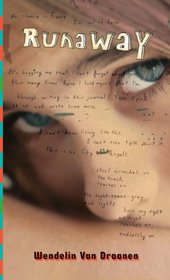Helpful Score: 1
Reviewed by Mechele R. Dillard for TeensReadToo.com
Twelve-year-old Holly has had enough of "the system." She is not going to let another foster dad touch her, or allow another foster mom to hit her. If she runs away, she knows she will have to fend for herself, but at least she won't have to worry about being locked in a utility room without food, or having her head shoved in a toilet as punishment for refusing to be touched. And, most appealing of all, she will not have to face being called a liar by the adults in "the system."
Holly believes that trusting adults can only result in trouble for her, and she cannot bring herself to take a leap of faith with her teacher, Ms. Leone. However, when she gives Holly a journal and suggests she explore writing as a source of comfort, Holly decides to give it a try, even though she is certain it is a waste of time: "Giving me this journal was a totally lame thing to do. You think writing will get me out of here? You think words will make me forget about the past? Get real, Ms. Leone!" (p. 1). However, over the next several months, Holly finds that the journal is the only friend she can trust, the only one that is always there for her and, ultimately, the only guide that keeps her on track to something better.
RUNAWAY, presented entirely as journal entries, follows Holly from May 17th until December 1st, as she chronicles her life on the streets and her constant search for food, a bath, and a warm place to sleep. Some of the poems seem a bit much to have come from the pen of a twelve-year-old, until one considers that Holly's life as a "gypsy"--inspired by a way of life one would hope is a bit much to actually exist in the real world, but, unfortunately, is neither farfetched nor unrealistic--makes her mature expression of ideas more than plausible.
RUNAWAY could be a real eye-opener for middle school kids, while easily being engaging enough for older teens. Additionally, although at 272 pages the book may appear lengthy for younger readers, the journal format will actually appeal to readers with shorter attention spans.
Twelve-year-old Holly has had enough of "the system." She is not going to let another foster dad touch her, or allow another foster mom to hit her. If she runs away, she knows she will have to fend for herself, but at least she won't have to worry about being locked in a utility room without food, or having her head shoved in a toilet as punishment for refusing to be touched. And, most appealing of all, she will not have to face being called a liar by the adults in "the system."
Holly believes that trusting adults can only result in trouble for her, and she cannot bring herself to take a leap of faith with her teacher, Ms. Leone. However, when she gives Holly a journal and suggests she explore writing as a source of comfort, Holly decides to give it a try, even though she is certain it is a waste of time: "Giving me this journal was a totally lame thing to do. You think writing will get me out of here? You think words will make me forget about the past? Get real, Ms. Leone!" (p. 1). However, over the next several months, Holly finds that the journal is the only friend she can trust, the only one that is always there for her and, ultimately, the only guide that keeps her on track to something better.
RUNAWAY, presented entirely as journal entries, follows Holly from May 17th until December 1st, as she chronicles her life on the streets and her constant search for food, a bath, and a warm place to sleep. Some of the poems seem a bit much to have come from the pen of a twelve-year-old, until one considers that Holly's life as a "gypsy"--inspired by a way of life one would hope is a bit much to actually exist in the real world, but, unfortunately, is neither farfetched nor unrealistic--makes her mature expression of ideas more than plausible.
RUNAWAY could be a real eye-opener for middle school kids, while easily being engaging enough for older teens. Additionally, although at 272 pages the book may appear lengthy for younger readers, the journal format will actually appeal to readers with shorter attention spans.





